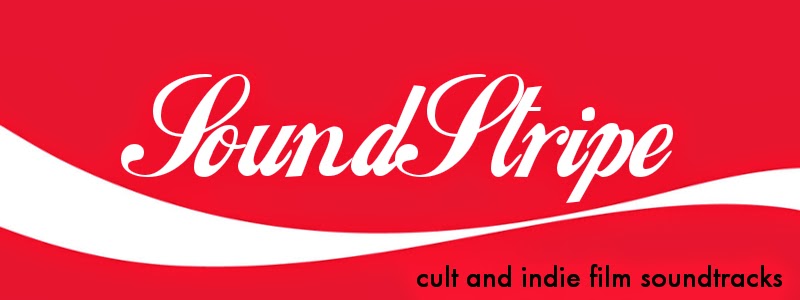Monday, April 27, 2015
"Tenebre" by Massimo Morante, Fabio Pignatelli, and Claudio Simonetti
The score for Dario Argento's giallo masterpiece "Tenebre" is so ahead of its time that I'm sure I could fool an unwitting friend into believing it came out yesterday. The main theme was used as a sample by the Parisian electronic duo Justice for the song "Phantom" on their well regarded 2007 album "Cross"; it features an epic evil robot sounding vocoder line and driving disco drum beat. Justice did not have to do much to it to make it sound new. In my opinion they definitely did it justice!! WAKA WAKA! Get out of here, Dad.
Throughout the film there's disparate styles coming together to create an effective score: heavy breakbeats with weird choirs and vocals by synthetic operatic demon women, syncopated bass lines, amazing Giorgio Moroder-esque disco (which plays under the credits, cutting out abruptly for a few seconds and then hilariously continuing right where it's left off in the next scene), and plenty of that weird funk sound that only Italians making music for giallo horror films seem to be able to create. Warbly, unsettling jack-in-the-box music and even baroque organ, neither of which sound on paper like something that would fit the general tone the composers have set fit in perfectly.
The three composers were ex-members of the legendary Italian band the Goblins, who scored many horror films in the 70's and 80's (including the well known "Suspiria", another giallo masterpiece of Argento's), and their mastery of making music for the genre is on full display.
I love Tenebre - not only is it a great film but there's plenty of WTF moments, particularly in the dialogue overdubbing; I spent almost the entire film trying to figure out if the cast was filmed speaking Italian and was later overdubbed in English, eventually coming to the conclusion that no, they're speaking English the whole time and occasionally (or really, more than occasionally) the audio doesn't seem to be synced up correctly, though I'm still not sure about it (do you know?). In one of the countless unintentionally hilarious moments two of the main characters try to sneak around behind the house of the suspected killer while wearing brightly colored clothes and whispering and talking to each other audibly to anyone within 50 yards. "He couldn't have seen us!" says one, as the suspected killer looks out his window. Watch this movie, listen to the soundtrack - (be warned that the link to the film is going to a streaming Amazon version which is really shitty quality; however it doesn't seem to be possible to stream a higher quality version (anyone out there know of one?) and to buy it on blu-ray or DVD seems a pretty expensive proposition but it's probably worth it. Cin cin!
Labels:
70's cinema,
Dario Argento,
film review,
film score review,
giallo,
horror,
horror movie,
horror movie reviews,
horror movies,
italian horror,
jake zavracky,
movie review,
music reviews,
tenbre,
the goblins,
unsane
Thursday, April 16, 2015
"Elevator To The Gallows" by Miles Davis
Labels:
film review,
film score review,
film-noir,
louis malle,
miles davis,
soundtrack review,
thriller
Wednesday, April 8, 2015
"Fight Club" By The Dust Brothers
The Dust Brother's soundtrack to David Fincher's "Fight Club" is full of the big beat sound popularized by the Chemical Brothers, Prodigy and the Crystal Method that was threatening to unseat hard rock as the preferred choice for arenas in the late 90's. Industrial bass synths complement piercing sirens and stiff, busy breakbeats. A lot of Fight Club's sonic elements and visual imagery might give you ecstasy flashbacks, if those exist, particularly Brad Pitt's rave-wear. The Dust Brothers inject energy and adrenaline to much of the film's action while keeping the instrumentation sparse enough so the music is loud without being overly intrusive. Distorted beats, wah guitar, metallic riffing, syncopated bass lines and at one point a drum kit with a three dimensional echo effect all augment the visual aesthetic the film keeps hammering home. The defining musical moment is not part of the score but the Pixies classic "Where is My Mind", which plays under the final scene. Much of the Dust Brother's work here is old enough to sound dated but not quite old enough to sound classic. We'll have to listen back in five years and see how it holds up.
The film itself of course is already a cult classic, there's very little that's dated about it save for a couple scenes where the CGI is pretty easy to spot; luckily there's not much of it. It's definitely a timepiece like Go, or Trainspotting; films that slickly reflected the fast paced stylistic aesthetic of the late 90's. This film may leave you with the feeling that it's fun to get punched in the face. Try to resist the urge to act on that notion. The quick cutting and breathless storytelling in David Fincher's direction are executed so well it makes you wonder what happened to him; not that there's anything with directing a solid thriller like Gone Girl or an engrossing docudrama like the Social Network, but Fight Club was ahead of its time. I'm sure Fincher goes to bed every night with the knowledge of that crying into his pillows made of million dollar bills, yearning for his lost youth.
Labels:
brad pitt,
david fincher,
dust brothers,
edward norton,
fight club,
film score review,
soundtrack review
Subscribe to:
Comments (Atom)



